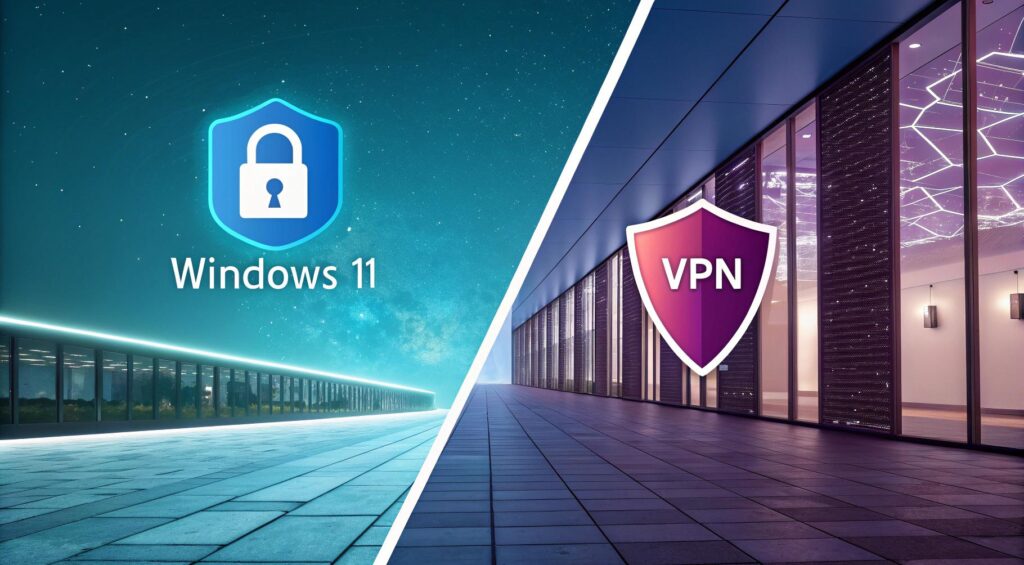Windows 11’s strong foundation—and why power users want more
Microsoft has made Windows 11 the most secure version of its operating system so far. According to the company, secured-core PCs running Windows 11 are far harder to compromise than older hardware. They block malware more effectively, see around 60 percent fewer security incidents, and face only a fraction of the firmware attacks that plagued previous devices.
That’s reassuring for most everyday users. But MSPowerUser readers are rarely average. They’re running Insider builds, managing Microsoft 365 tenants, or sinking hours into Xbox Game Pass. For them, the question isn’t whether Windows 11 is safe enough. It’s how to take stronger control of their privacy, how to keep data secure when traveling, and how to get around the limits built-in tools can’t always cover.
That’s where a Virtual Private Network, or VPN, makes sense.
Why VPNs matter for Windows 11 users?
Start with public Wi-Fi. Even with Windows 11’s firewall and encryption, there are risks when logging in at an airport lounge or hotel hotspot. Security researchers like to show off “evil twin” attacks at conferences, rogue Wi-Fi networks that look legitimate but trick devices into connecting. Once you’re on, attackers can scoop up login details without much effort. It doesn’t take long, a distracted professional on the way to a meeting could lose Outlook credentials in seconds. Windows Central’s 2024 Wi-Fi guide specifically recommends VPNs here, since encryption makes stolen traffic unreadable.
Privacy is another concern. Windows 11 has improved its privacy settings, but most internet traffic still passes through ISPs, advertising networks, and analytics services. That leaves behind a clear trail of activity and location data. Tom’s Guide described VPNs as “tools that encrypt your internet traffic and anonymize your online identity.” In practice, that means ISPs and advertisers can’t build a profile around your habits. For a developer logging into GitHub from a hotel, or a data scientist testing Copilot features on the road, that extra protection quickly becomes essential.
And then there’s entertainment. Xbox Game Pass, Netflix, and Disney+ restrict access by region. TalkSport pointed out earlier this year that VPNs don’t just unlock new titles—they also reduce tracking and, in some cases, help users avoid paying inflated prices. A gamer in Berlin might connect to the U.S. to play a release a week early, while students abroad can still stream shows from their home country. For many, VPNs don’t just make Windows 11 private—they make it far more open.
What power users should know
- VPNs keep Teams calls, Outlook logins, and file transfers safe on public Wi-Fi.
- They limit what ISPs, advertisers, and other third parties can see.
- They unlock Xbox Game Pass and global streaming catalogs.
Value beyond security

VPNs aren’t about replacing what Windows 11 already does well. They’re about continuity. Work tools stay consistent, whether you’re logging in from home or from a café in another country. Subscriptions behave the same when you travel. And VPNs add what security experts call “defense in depth”: Windows 11 keeps malware out, while VPNs prevent snooping and interception. Combined, they cover far more ground than either can on its own.
Choosing wisely
Not every VPN is right for Windows users. The ideal choice depends on balancing speed, privacy, and usability. Some services prioritize privacy above all else, but slow connections can make Teams calls or Xbox gaming frustrating. Others are lightning fast but lack a transparent no-logs policy, raising concerns about how data is handled behind the scenes. Experienced users tend to look beyond marketing claims, preferring providers that offer independent audits, straightforward policies, and responsive support before they put real trust in them
A few names consistently stand out. ExpressVPN is often praised for its fast global servers, making it a reliable option for streaming and gaming with low latency. NordVPN appeals to users who want more advanced tools, such as Double VPN routing or built-in malware blocking. More recently, X-VPN has gained attention among Windows users for blending speed with flexibility. It delivers solid performance for everyday browsing and streaming, while its cross-platform plans and straightforward interface make it easy to use without technical expertise. And for those who want practical guidance, X-VPN also offers resources such as how to turn off a VPN on your computer, giving users more control over when and how they connect.
Pairing VPNs with Windows 11’s tools
The benefits of a VPN multiply when used alongside Windows’ own features. Windows Hello secures logins at the device level. BitLocker ensures files on a lost laptop remain protected. Defender blocks malware in real time. Add a VPN, and even traffic in transit—Teams chats, OneDrive syncs, Xbox connections—becomes harder to intercept.
A few small habits go a long way too. Setting the VPN to connect automatically on unknown Wi-Fi removes the risk of forgetting to turn it on. That single step can close one of the most common gaps in protection. Looking ahead, VPNs may become even more important as Microsoft leans more heavily on cloud and AI-driven tools. Services like Copilot, Azure, and Xbox Cloud Gaming depend on a steady flow of data. Making sure that flow is private, reliable, and consistent will only grow more critical.
Conclusion: a more complete Windows experience
Windows 11 provides one of the strongest foundations of any consumer operating system. But power users know that’s just the starting point. VPNs extend privacy where ISPs and advertisers still see too much. By masking location, VPNs make cloud services and subscriptions feel consistent—even when you’re working or streaming halfway across the world. And they add flexibility, unlocking games and media that would otherwise be region-locked.
For professionals, that could mean sending Outlook attachments securely while traveling. For gamers, it could mean playing a Game Pass release a week ahead of schedule. Either way, the outcome is the same: fewer limits, and more control. ExpressVPN and NordVPN remain trusted names with long track records, while many advanced users find X-VPN strikes the right balance of speed, stability, and ease of use.
The bottom line is straightforward: Windows 11 keeps your device safe. A VPN helps keep your entire digital life private, reliable, and borderless.


